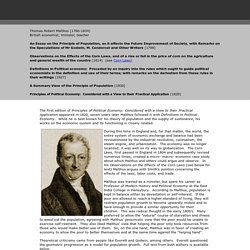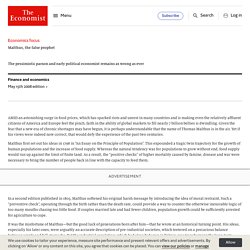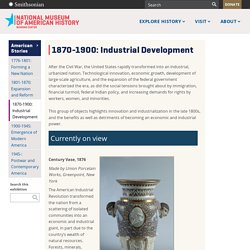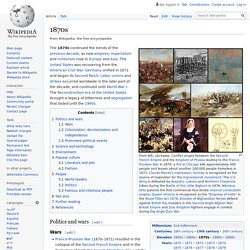

Www.dictionary. [ mal-thuh s ] / ˈmæl θəs / noun Thomas Robert,1766–1834, English economist and clergyman.

Dictionary.com Unabridged Based on the Random House Unabridged Dictionary, © Random House, Inc. 2020 Examples from the Web for malthus The misery check, as Malthus called all those influences that are not prudential, is an ugly phrase not fully justified.Malthus shows the necessity of observing other collateral results.Mill was an awkward antagonist, and Malthus certainly not conspicuous for closeness of logic.Malthus again reckons among vices practices which limit the population without causing 'misery' directly. Malthus's home was within a walk of Farnham, where Cobbett had been born and passed his childhood. British Dictionary definitions for malthus Malthus Thomas Robert. 1766–1834, English economist. Collins English Dictionary - Complete & Unabridged 2012 Digital Edition © William Collins Sons & Co.
Malthus. Further Resources: Works by Thomas Robert, Malthus (1766-1834) An Essay on the Principle of Population (1798) from Project Gutenberg An Essay on the Principle of Population as It Affects the Future Improvement of Society, with Remarks on the Speculations of Mr.

Godwin, M. Condorcet, and Other Writers. An Essay on the Principle of Population: A View of its Past and Present Effects on Human Happiness; with an Inquiry into Our Prospects Respecting the Future Removal or Mitigation of the Evils which It Occasions Published: London: John Murray, 1826. Www.cam.ac. The controversial theorist Thomas Robert Malthus did not much enjoy travelling.

Invited by his friend and fellow political economist, David Ricardo, to stay at the country house of Gatcombe Park in Gloucestershire, he declared that “that part of the world” was simply too far from his home near London, and wrote that he’d resolved “not to make distant excursions more than once a year”. Malthusianism - Buscar con Google. Amp.economist. AMID an astonishing surge in food prices, which has sparked riots and unrest in many countries and is making even the relatively affluent citizens of America and Europe feel the pinch, faith in the ability of global markets to fill nearly 7 billion bellies is dwindling.

Given the fear that a new era of chronic shortages may have begun, it is perhaps understandable that the name of Thomas Malthus is in the air. Yet if his views were indeed now correct, that would defy the experience of the past two centuries. Malthus first set out his ideas in 1798 in “An Essay on the Principle of Population”. This expounded a tragic twin trajectory for the growth of human populations and the increase of food supply. Whereas the natural tendency was for populations to grow without end, food supply would run up against the limit of finite land.
Www.britannica. En.m.wikipedia. British political economist Thomas Robert Malthus FRS (; 13/14 February 1766 – 23 December 1834)[1] was an English cleric, scholar and influential economist in the fields of political economy and demography.[2] Malthus saw population growth as being inevitable whenever conditions improved, thereby precluding real progress towards a utopian society: "The power of population is indefinitely greater than the power in the earth to produce subsistence for man".[4] As an Anglican cleric, he saw this situation as divinely imposed to teach virtuous behaviour.[5] Malthus wrote that "the increase of population is necessarily limited by the means of subsistence"; "population does invariably increase when the means of subsistence increase"; and "the superior power of population is repressed by moral restraint, vice and misery".[6] Early life and education[edit] Population growth[edit]

What-was-the-greatest-era-for-american-innovation-a-brief-guided-tour.amp. We’re in the golden age of innovation, an era in which digital technology is transforming the underpinnings of human existence.

Or so a techno-optimist might argue. We’re in a depressing era in which innovation has slowed and living standards are barely rising. That’s what some skeptical economists believe. The truth is, this isn’t a debate that can be settled objectively. Which was a more important innovation: indoor plumbing, jet air travel or mobile phones? Www.britannica. Franco-German War, also called Franco-Prussian War, (July 19, 1870–May 10, 1871), war in which a coalition of German states led by Prussia defeated France.

Americanhistory.si. After the Civil War, the United States rapidly transformed into an industrial, urbanized nation.

Technological innovation, economic growth, development of large-scale agriculture, and the expansion of the federal government characterized the era, as did the social tensions brought about by immigration, financial turmoil, federal Indian policy, and increasing demands for rights by workers, women, and minorities. This group of objects highlights innovation and industrialization in the late 1800s, and the benefits as well as detriments of becoming an economic and industrial power. Century Vase, 1876 Made by Union Porcelain Works, Greenpoint, New York. En.m.wikipedia. The 1870s continued the trends of the previous decade, as new empires, imperialism and militarism rose in Europe and Asia.

The United States was recovering from the American Civil War. Germany unified in 1871 and began its Second Reich.